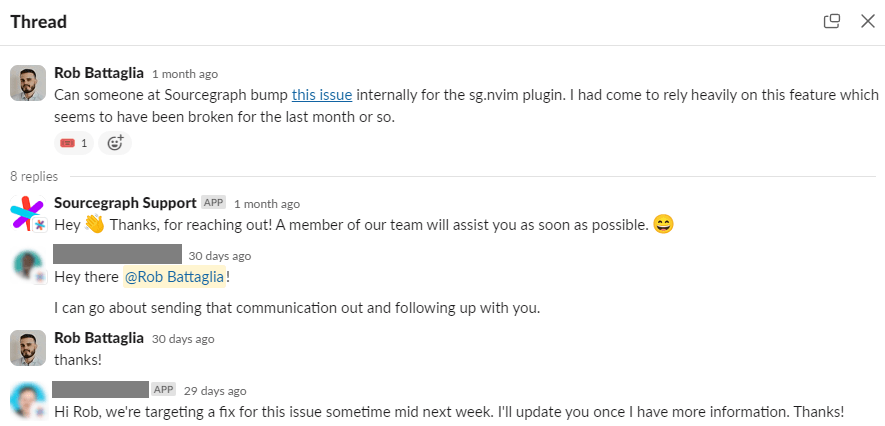My First Foray into Open-Source Contribution

My journey into the realm of open-source contribution was both unexpected and rewarding. At the heart of this adventure was a tool I had integrated deeply into my daily workflow: the Sourcegraph Neovim plugin. In particular, its :SourcegraphLink command had become indispensable for my collaboration tasks.
A Vital Tool in My Workflow
Working in a large codebase can be daunting. The ability to quickly navigate and reference specific parts of the code is crucial, not just for development, but also for communication and documentation. The :SourcegraphLink command was a game-changer for me. With a few simple keystrokes, it would generate a shareable link to the exact line of code under my cursor, and add it to the "+ register (clipboard). This feature enabled me to efficiently link to code sections when commenting in JIRA tickets or creating design docs.
Encountering a Sudden Issue
As the new year dawned, I encountered a sudden problem: the :SourcegraphLink command stopped working. Whenever I ran the command, an error message would appear. I tried to update the plugin with my plugin manager, lazy.nvim, but to no avail. I had more immediate tasks at hand, and reverted to manually finding the line of code on the web to create a shareable link.
As the days went on, I kept forgetting the command was broken, until I stopped trying to use it altogether. I stopped linking to code as often, as the task of manually getting a link caused too much toil. The quality of my documentation certainly took a hit.
Enough was Enough
I reached a point where I decided this needed to be addressed. I turned to the plugin's GitHub repository and found an issue already reported by another user: Issue#204. I figured I would use my current company's relationship with Sourcegraph to my advantage. We have a shared Slack channel with some Sourcegraph employees. I brought the issue to their attention and asked for support, because I had come to rely on it so much. They assured me it would be prioritized in the next week.

The week came and went but the issue persisted. Determined to restore the functionality I had come to rely on, I decided to dive into the problem myself. I knew that the regression happened around the new year, so I decided to look at recent commits from that time period. One commit jumped out to me, "fix: support visual range for :SourcegraphLink" from Pull Request#204. To confirm my suspicion, I updated my lazy-lock to point to the previous commit, cb5c6e9. The command began working again! I found the root of the issue.
I had never written lua besides adjusting my neovim configs. While it's a simple language, I had to familiarize myself with the syntax. Another feature of the same plugin—the AI assistant from Sourcegraph, "Cody"—assisted in the fix. . I asked Cody how to write a try catch block in lua, without having to leave my editor. I had the change set very quickly after that.
With a mixture of excitement and nervousness, I submitted Pull Request#206 with my proposed fix. For a few days, there were crickets, until the core maintainer TJ responded. It was a simple fix, so there was no feedback except an acknowledgment that the changes looked good. It was a few more days before the PR was merged. Once I got the email it was merged, I excitedly updated the plugin once again. Alas, it worked!
Reflecting on the Journey
This experience taught me several valuable lessons about the open-source community and software development:
Proactivity Pays Off: Encountering a problem in an open-source tool doesn't mean you're at a dead end. Taking initiative can lead not just to a solution but also to personal growth.
Community Collaboration: The open-source community thrives on collaboration. Don't hesitate to reach out for help, and when you can, offer your support to others.
Every Contribution Matters: You don't need to reinvent the wheel to make a significant impact. Sometimes, addressing a small bug can significantly improve many users' workflow and productivity. Seeing my fix go live and restore functionality to a tool I personally relied on was incredibly satisfying.
Contributing to the Sourcegraph Neovim plugin has been an empowering experience. It underscored the importance of open-source tools in our workflows and the power of community collaboration. As I continue to use this plugin and others like it, I'm now more aware of the collective effort behind each line of code and more committed than ever to contributing to the open-source ecosystem.
